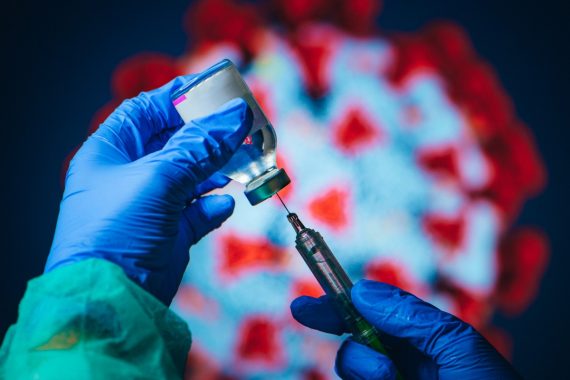Phase three trials have begun for an alternative Covid vaccination made up of a cocktail of antibodies, which could be more suitable for the immunosuppressed.
The global clinical trials are set to recruit 5,000 adults who are at increased risk of Covid infection or inadequate vaccination response, including an estimated 1,000 UK patients across nine sites.
A UK participant has already become the first in the world to receive the injection, which is a single-dose long-acting antibody combination developed by AstraZeneca.
AstraZeneca head of research and development Dr Sir Mene Pangalos said he hopes the vaccine could protect people for ‘about six to twelve months’ – but ‘hopefully’ closer to a year.
The injection is also being investigated in a ‘post-exposure-prophylaxis setting’, for example to immunise all care home residents after a confirmed case, with phase three trials also set to begin in the UK and the US, he added.
And Dr Pangalos said that researchers are exploring whether the injection could be used in an outpatient treatment setting including GP practices as well as inpatient settings, following confirmed Covid infection.
He said: ‘If someone comes into the doctor – the GP or the hospital – [with] confirmed Covid disease and symptoms, we treat them with the antibody and then they go home and we hopefully stop them getting sicker.
‘These will not just be intravenous – they’ll also be intramuscular – and that becomes very important, particularly in the community settings. If you think about wanting to dose lots of people, IV is much more difficult than doing it intramuscular where you can do it in the community with GPs, nurses, etc.’
Professor Andrew Ustianowski, principal clinical research lead at North Manchester General Hospital, said UK trial recruits will be a ‘mixed group’.
This will include the immunosuppressed, those who may have intolerance or vaccine contraindications and those who may be at higher risk to exposure, which ‘may include healthcare staff’, he added.
Head of the Government’s Vaccine Taskforce Kate Bingham said: ‘It’s crucial that we leave no one behind as we move closer to finding both a vaccine and developing more treatments for Covid-19.
‘We particularly need to ensure those cannot be given a vaccine, such as people who are immunocompromised, have alternatives available that will help protect them.’
The UK Government has also agreed to secure access to one million doses of the treatment if current trials prove successful, business secretary Alok Sharma added.
It comes as GPs are not yet advised to vaccinate the households of immunosuppressed patients against coronavirus, the Government’s vaccines advisory body has said.
However, the UK Joint Committee on Vaccination and Immunisation (JCVI) will consider a ‘cocooning strategy’ once more data is available, it said.
Last week, new Public Health England (PHE) guidance said that immunosuppressed individuals ‘may not make a full antibody response’ following Covid vaccination and should continue to follow advice to ‘avoid exposure’.
The provisional guidance added: ‘Consideration should also be given to vaccinating the adult household contacts of immunocompromised adults, i.e. individuals who share living accommodation or those who provide care for whom continuing close contact is unavoidable.’
A table listing clinical risk groups ‘who should receive Covid-19 immunisation’ reiterated that vaccination ‘should be offered’ to the household contacts of the immunocompromised ‘given the likely lower effectiveness of vaccination in this group’.
However, new JCVI guidance published this week said that it is currently ‘not in a position to advise vaccination solely on the basis of indirect protection’.
The guidance said: ‘Many individuals who are clinically extremely vulnerable will have some degree of immunosuppression or be immunocompromised and may not respond as well to the vaccine. Therefore, those who are clinically extremely vulnerable should continue to follow government advice on reducing their risk of infection.
‘Consideration has been given to vaccination of household contacts of immunosuppressed individuals. However, at this time there are no data on the size of the effect of Covid-19 vaccines on transmission.’
It added: ‘Evidence is expected to accrue during the course of the vaccine programme, and until that time the committee is not in a position to advise vaccination solely on the basis of indirect protection.
‘Once sufficient evidence becomes available the committee will consider options for a cocooning strategy for immunosuppressed individuals, including whether any specific vaccine is preferred in this population.’
A PHE spokesperson told Pulse that its provisional guidance will be updated shortly to reflect the JCVI’s latest recommendations.
PHE is also set to update its guidance to reflect new advice that over-16s with underlying health conditions should be vaccinated against Covid.
GPs have been given the green light to start administering Covid vaccinations from next week (14 December), while hospital hubs will start to deliver the first vaccinations today (8 December).
Additional reporting by Eleanor Philpotts
Pulse July survey
Take our July 2025 survey to potentially win £1.000 worth of tokens












